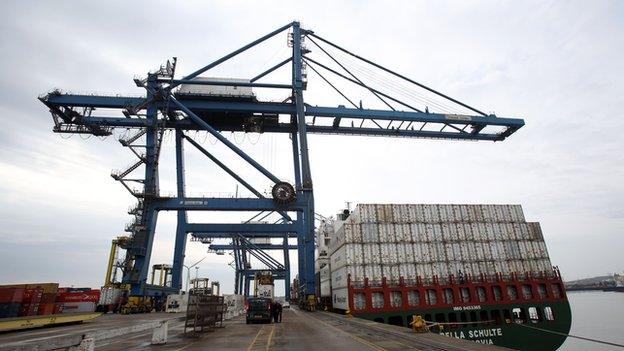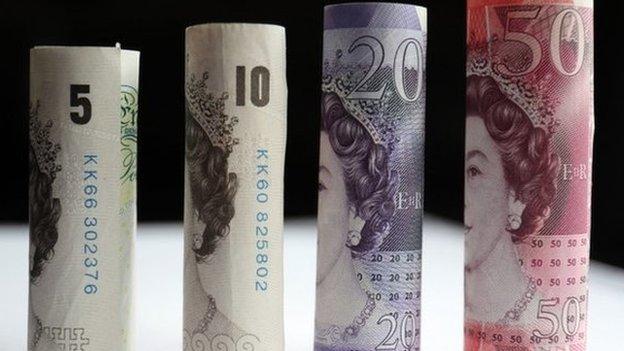How crucial is the current account deficit?
- Published
- comments

The Office of National Statistics (ONS) released two important sets of data today. The headlines have been grabbed by the better-than-expected GDP numbers and I have no doubt that growth will feature heavily in the political battle of the next few weeks.
Today's other major statistical release will get less attention in the next few days but may be just as important. Last year the UK's current account deficit was 5.5% of GDP, the largest annual deficit since the modern records began in 1948.
The current account is measure of whether a country is a net lender or a net borrower from the rest of the world. So, does the UK being a large net borrower from other states actually matter?
This is one of those questions to which the best answer is "it depends". For advanced economies like the UK, current account deficits have a habit of not really mattering until such a time as investors decide they do matter. At which point they can matter a great deal.
The current account is a broader measure than the more commonly discussed trade balance. It consists of three elements. The first is the trade balance, that's the total value of UK exports of goods and services, minus UK imports of goods and services.
The second is net transfers, this is money sent to or received from abroad for which nothing is expected in return - think of remittances by immigrant workers or international development spending.
Finally there's net investment income. That's the difference between the income on UK investments overseas and income of foreign investments in the UK. Add these three elements together and one gets the current account. The current account is just one half of the balance of payments, which - as its name suggests - balances.
The counterpart to a current account deficit or surplus is a capital account surplus or deficit. So, another way of looking at the UK's record current deficit is a record capital account surplus.
The current account measures income but the capital account measures changes in the ownership of assets. In others words foreign money is flowing into the UK.
There is nothing intrinsically wrong with running a current account deficit and there is nothing intrinsically virtuous about running a current account surplus. The worry comes when a surplus or deficit proves to be large and persistent. A large and persistent deficit can signal an economy that is otherwise consuming domestically and not really paying its way in the world, a large and persistent surplus can signal a country where domestic demand is too weak and growth is overly reliant on exports.
Before deciding if the UK's current account deficit is something to worry about, it is important to be clear on why it is so large. This isn't really to do with exports and imports of goods and services, the UK's trade balance has been (in general) in deficit for decades.
What has changed in recent years is the net investment position. The pattern of the UK current account since the early 1980s has been a largish deficit in the trade balance somewhat offset by a surplus on the net investment position. British investments overseas have yielding a better return than foreign investments in the UK.
Since 2011 though that hasn't been the case. The net investment position has swung from a positive number to a negative one. That means our record deficit isn't driven by a poor exporting performance or a reliance on imported goods.
The exact reasons for this swing are still being debated. It may be that the UK is a victim of its own success - the better performance of our economy relative to the eurozone, for example, may have increased foreign profits earned in the UK while depressing UK profits in the continent.
Or perhaps the pulling back of British banks from overseas operations post-2008 is having an impact.
There are those who point out that these sorts of flows are very difficult to measure and it may be that the apparent widening of the current deficit is just a quirk of how the figures are calculated. Oxford Economics, for example, have today pointed out that when UK houses are sold to foreign buyers that is not counted as an export in the way a UK made car being sold abroad would be.

On one fundamental level a current account deficit is not a problem as long as it can be financed. The UK can remain a large net borrower as long as foreigners are prepared to keep stumping up the cash. For the last few years the UK has played the role of safe haven in an often turbulent world economy. As long as things remain turbulent internationally, the UK shouldn't have a problem financing its deficit.
Of course if the outlook for the global economy were to improve, then that relative safe haven status could come under threat. The first signs of such a changing view from international investors would a decline in the value of sterling.
The latest forecasts from the Office for Budget Responsibility suggest that the current deficit will gradually narrow in the years ahead. The deficit will erode gradually rather than exploding in a sudden loss of confidence in the UK.
But even if the current account deficit is manageable - and there are more than few investors in the City who fret about it - its existence can still tell us something about the UK economy. A large current deficit - or surplus - usually signals some imbalance in the underlying domestic economy.
Whoever wins May's election, the task of "rebalancing" the UK economy towards a more sustainable growth path looks set to continue.
- Published31 March 2015

- Published31 March 2015

- Published31 March 2015
